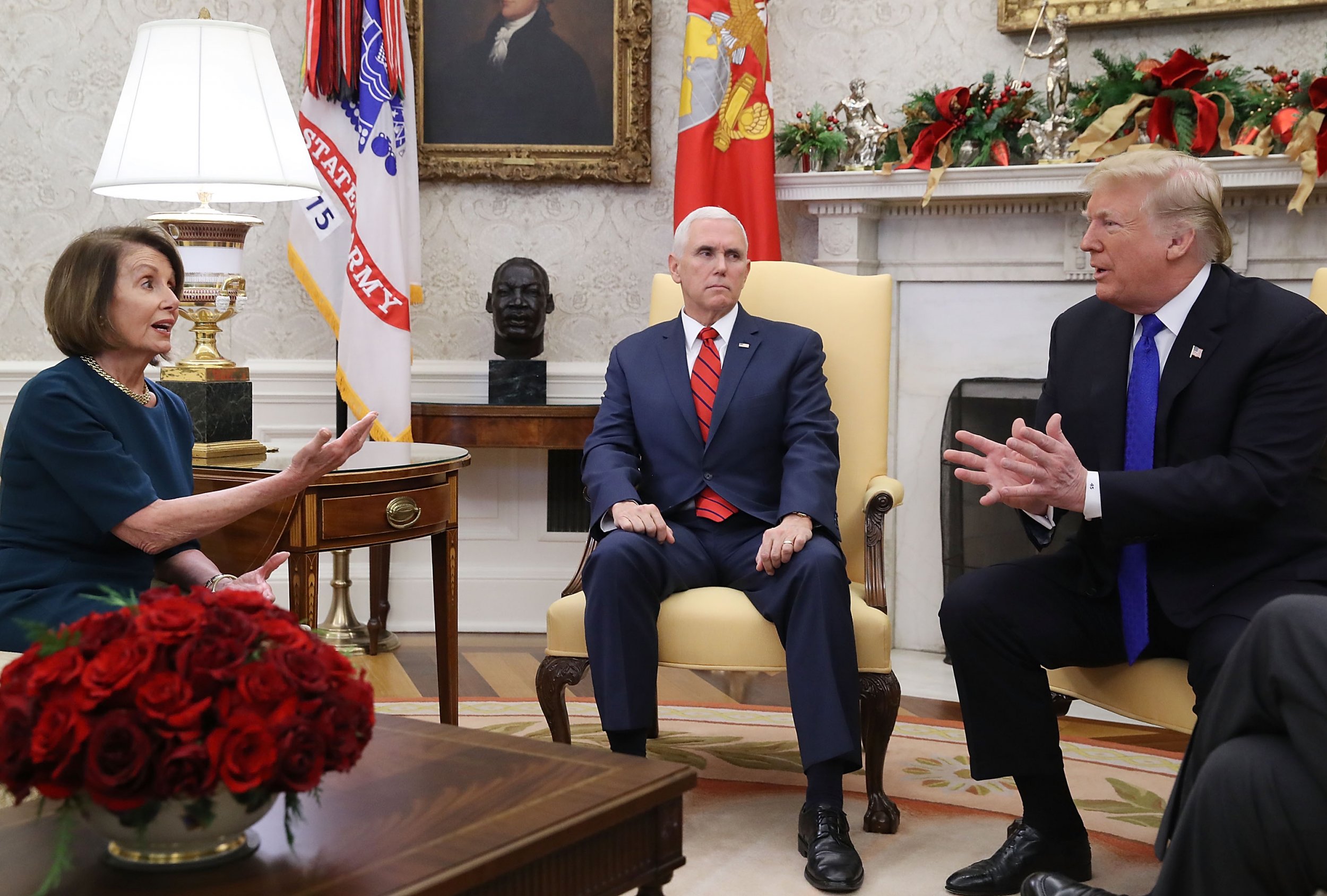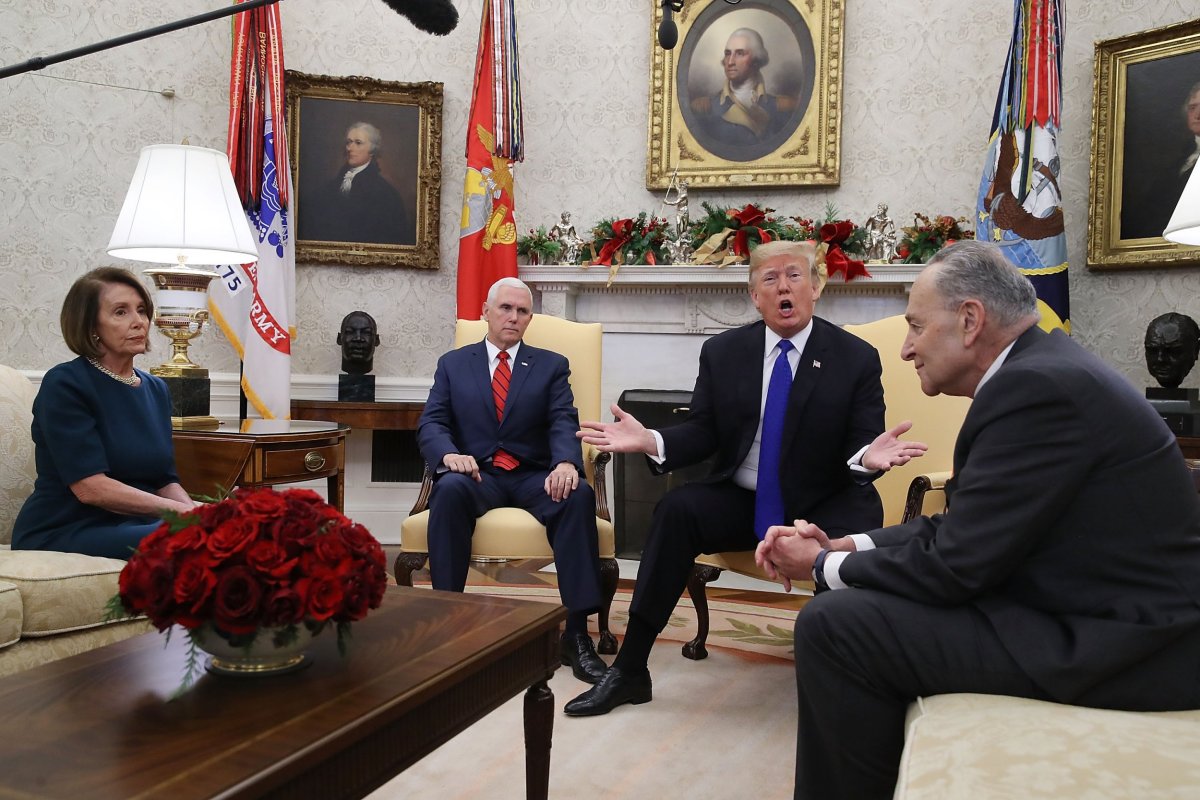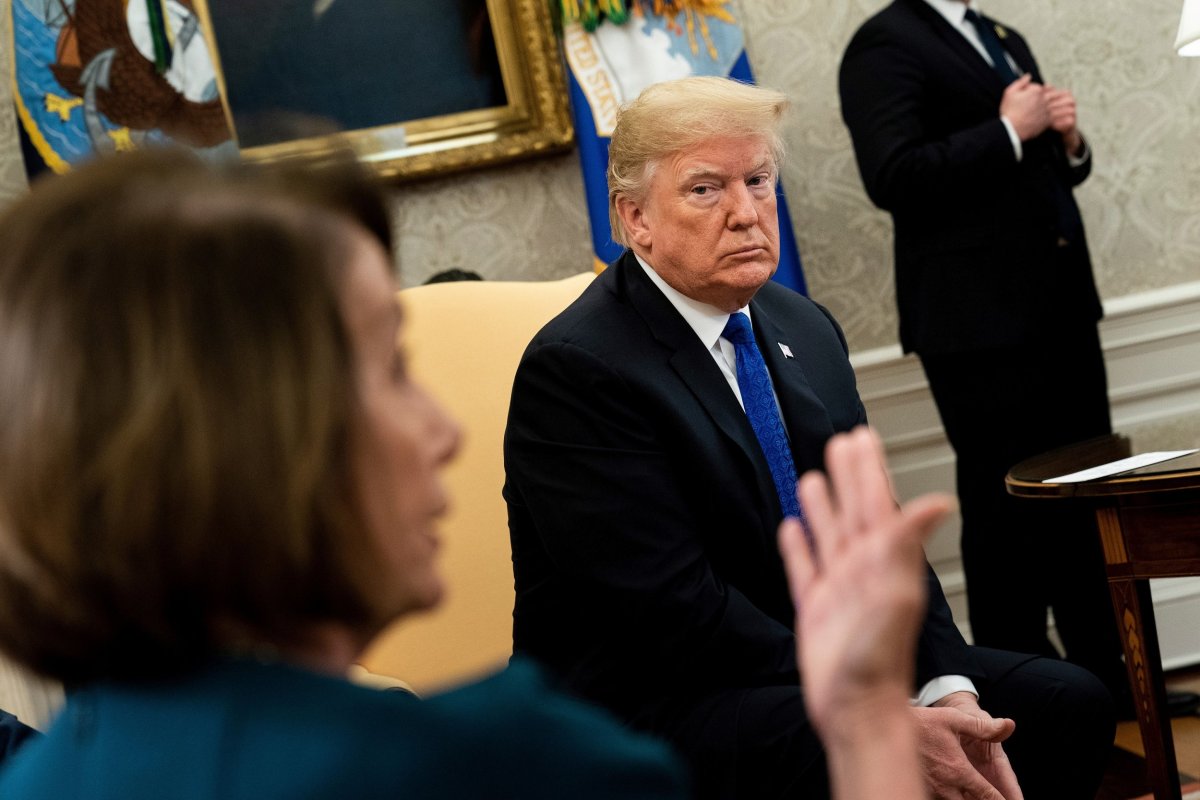
This week's Oval Office showdown featuring President Donald Trump, House Speaker Nancy Pelosi, Senate Minority Leader Chuck Schumer and Vice President Mike Pence was a memorable moment of American political theater. The spectacle offered a glimpse into how three powerful men and one powerful woman negotiate—or don't—in the #MeToo era and in the wake of an historic electoral victory for women. To make sense of it, Newsweek invited feminist author, psychologist and ethics expert Carol Gilligan to discuss of the interactions with an eye toward Pelosi's role in the roomful of men.
Gilligan has shaped the conversation on gender, communication, conflict, morality and ethics for decades, and has just published her 13th book, with Naomi Snider, called Why Does Patriarchy Persist? In it, she argues that patriarchy and democracy are at cross-purposes and cannot co-exist. She said the Oval Office confrontation could become a teaching tool in her classes at New York University, where she is a professor. "The clash between patriarchy and democracy: You could teach that from that 10-minute video," she said.
She offered a play-by-play analysis of the Oval Office action.
Minutes 0:15 to 3:00: After a long preamble from Trump about the need for a border wall, Pelosi brings up his threat of a government shutdown, and she and Trump go back and forth about whether they should negotiate in front of the cameras. Pence and Schumer are silent.
Gilligan: Okay, the first thing, look at the way all these guys are sitting. She's got her legs together and—
Are we talking about manspreading?
Yes. It's like they naturally sit like that, they are not even aware. They are dominating the situation. They are taking up a lot of space.
Are the men also dominating each other in that way?
It's not even about her or each other. I think they are saying, "This is my space." They are completely unself-conscious. They are siting there with their legs spread and Trump with his big hand gestures. And she is kind of perched on the edge of her chair. She's got her legs together. Hands folded. She is very patient, and she is listening to him.
Is listening a particularly womanly trait?
I wouldn't go there. Simply looking at this picture. Three men and one woman. It's striking because particularly Trump and even the silent Pence are taking up a lot of space.

She is just there with her hands folded, waiting to speak. And he's speaking over her. She is waiting, and she is actually listening to him. What is extraordinary to me about her in this scene is that she has come to say something. She says we want to negotiate because we serve the American people.
Where that comes very close to my work, which is about dealing with human conflicts, is that she keeps insisting we have come to have a negotiation. And he says, "My way or the highway." She supports the idea that we solve human conflicts by talking and listening. This is the key thing. She listens. He doesn't. She says it even by her presence. Then he really rides over her. He talks over her.
Minute 3:00: Schumer, who has been sitting silently, weighs in, reminds Trump that the Washington Post has just given him extra Pinocchios for lies about the wall.
Schumer is doing something different with Trump.
He is in a sense trying to outplay Trump. He turns to look at the reporters to say, don't you get my point? She doesn't do that. He and Pelosi have come to have a conversation to try to avoid shutting down the government. She is the one who articulates the needs of the American people. She says people are hurting. She tries several times. And it is finally Schumer who pushes him to the point where you could say Trump loses it. Schumer is listening to Trump, but he is looking out at the press. You can see that he is playing to the press.
Minute 4:40: Pelosi explains the role of the legislature to Trump.
Now she is giving Trump a civics lesson. The extraordinary thing about this is her clarity. She will not be bullied by him. She is respectful. She calls him Mr. President. She is very clear: We can't have a discussion. And as she is talking, she is being a little more expansive. And you see her listening here. She is listening to Schumer. She is trying to get in. Then he just cut her off.
Minute 5:50: Schumer smirks about Trump's boasts about his Senate wins in red states.
What does it indicate to you about her role that Schumer, not she, jokes about Trump's wins in Indiana and North Dakota, and smirking and baiting Trump, and she doesn't?
I worry that people say she's humorless. She is very clear that she is there to represent the legislature, to try to do something. This is right out of my work. She says things like, "A lot of Republicans have just lost their jobs." There is a way of approaching conflict which seeks to basically talk it through, to be concerned with who you have a responsibility toward. She reminds him as a member of the legislature that Americans are going to be hurt if the government gets shut down. This is verbatim from what I call the ethics of care. In our culture, the ethic of care tends to be gendered feminine. It is often assigned to women.
What Trump is illustrating is, "I have the power. I am going to define the issue, and I have the power to do that." So when Chuck says you don't need a wall for border security, he ignores that. He won't even listen. Sometimes Chuck looks uneasy. He does succeed in pushing Trump. But it's Pelosi who doesn't lose her cool. There is a point where Schumer and Trump are back and forth.
In that room, is it all about whose male appendage is bigger?
You could say that Schumer and Pelosi both come to negotiate with the president, but it is Pelosi who holds her ground in the face of repeated interruptions and Trump telling her what the issue is and his patronizing comment about it being hard for her to speak. Schumer gets drawn in to what is a kind of pissing contest and in fact succeeds in provoking Trump to a bald assertion of power: "I'll take it," Trump says, meaning, I think, Schumer's dare, and then goes on to say that if "we" (the royal we) don't get what we want (meaning the wall) whether from you or through the military or whatever, I'll shut down the government. It's an incredible view of the current conflict between democracy and patriarchy.
And she doesn't go there. You notice her posture doesn't change. She knows why she's there. She gives him a mini civics lesson in the middle. And says if you have the votes, then call a vote. She calls his bluff. She is clear what she's doing there. And also, what's striking is Trump tries to divert her. He speaks over her, interrupts her and tells her what the issue is.
Minute 8:18: Trump says Pelosi is having a hard time.
Here Trump says, "I understand Nancy is in a situation, it's hard for her to talk about it." That is condescending. Throughout, he calls her Nancy while she calls him Mr. President. Now he has said something which I think is patronizing: "Oh, the little woman is upset." It's almost like she's probably having her period, but she's too old.

And she says no. Listen to what she says now: "Mr President, please don't characterize the strength that I bring to this meeting as the leader of the House Democrats, who just won a big victory."
What is extraordinary is she stays in her own framework. She says, Don't speak for me, I speak for myself. She is by her position exposing what's going on. We get an incredible view into a president for whom the issue is manhood at all costs because he's insecure.
But don't his fans just see his condescension and shouting her down as strength?
His insecurity is in his need to dominate and in that he cannot engage in actually listening to her or Schumer. It is so important to him that he be right. He has got be the voice of authority and the only way he can do it is by interrupting, shouting and not listening. Someone who is confident in their authority can listen and can be in a relationship. At one point Trump said, "We are getting along." But he's not in a relationship with them, and they are not getting along, and he's falsifying reality and you see it playing out in front of you.
Does this spectacle help you answer the question that is the title of your book?
This is a perfect vignette of the clash between patriarchy and democracy. Why does patriarchy persist in the face of our commitment to democracy? Democracy is based on an assumption of equal voice. You come together and solve conflicts with free and open debates. The patriarchy assumes that because he is the patriarch, he is the winner and his voice is the voice of authority. And Trump speaks in the voice of the patriarch. Patriarchy persists through the use of force: If I don't get my wall from talking to you or by using the military, I will shut down the government.
And Pelosi speaks as the voice of democracy. We are here to negotiate. Don't speak for me.
The question in our book is why does patriarchy persist when we claim to be a democratic society. And there we saw it: He [Trump] revealed himself as someone who is not committed to democracy. He is not there to negotiate. He is there to enforce his will.
Are there signs in in this encounter that suggest patriarchy is not persisting?
I think Pelosi said it: Look at the election, look at the diversity, the women, the young people. We have a 28 year old coming into the Congress. The difference is in the nonpatriarchal voices. I really think we saw how it works with Nancy Pelosi. Trump got to Schumer in a way that he didn't get to her. Why? She didn't have a male ego on the line. She was a woman speaking from a position of strength and of democratic values. My sense is she was saying, we are going to prevail.
We do have Trump to thank for revealing that clash by inviting the press in there.
That's because he doesn't question his authority. He defines truth. He calls it transparency. And she says no no no, there's no transparency until we agree on the facts. There is no conflict for him. He is a winner not a loser, strong not weak, he is a manly man, and he defines reality, he decides what's true and what's false and it is completely anti-democratic. What is patriarchy? Hierarchy that elevates some men over other men, like Little Marco, and elevates all men over all women. And you see that where he says, "Poor Nancy, she's having a hard time." Ultimately it is a not a "women's issue," it is an issue of democracy. It is two frameworks. If you look at it in the patriarchal framework, he is the strong leader. If you look at it through a democratic frame, he was not granting her equal voice, he was constantly interrupting and speaking over her. She was the most respectful person in that room.
Care to give us your take on Vice President Pence's role in this tableau?
Pence has fully accepted his role in the patriarchy which is to be the supporter of the patriarch. So he mirrors his posture. There is only one voice that counts in the patriarchy. The voice of the father, the leader, the commander in chief. Afterward, Pelosi gendered it. She said his manhood is on the line with the wall. And it is a certain kind of manhood, a manhood of always being right, of speaking, prevailing and not listening. I think she's right: He is insecure, and he has to prevail, he has to assert himself, and he has to dominate. His legs splayed wide; open, big hand gestures. Pence mirrored his positions without saying anything. The mirror, that was his role.
Uncommon Knowledge
Newsweek is committed to challenging conventional wisdom and finding connections in the search for common ground.
Newsweek is committed to challenging conventional wisdom and finding connections in the search for common ground.
About the writer
Nina Burleigh is Newsweek's National Politics Correspondent. She is an award-winning journalist and the author of six books. Her last ... Read more
To read how Newsweek uses AI as a newsroom tool, Click here.








